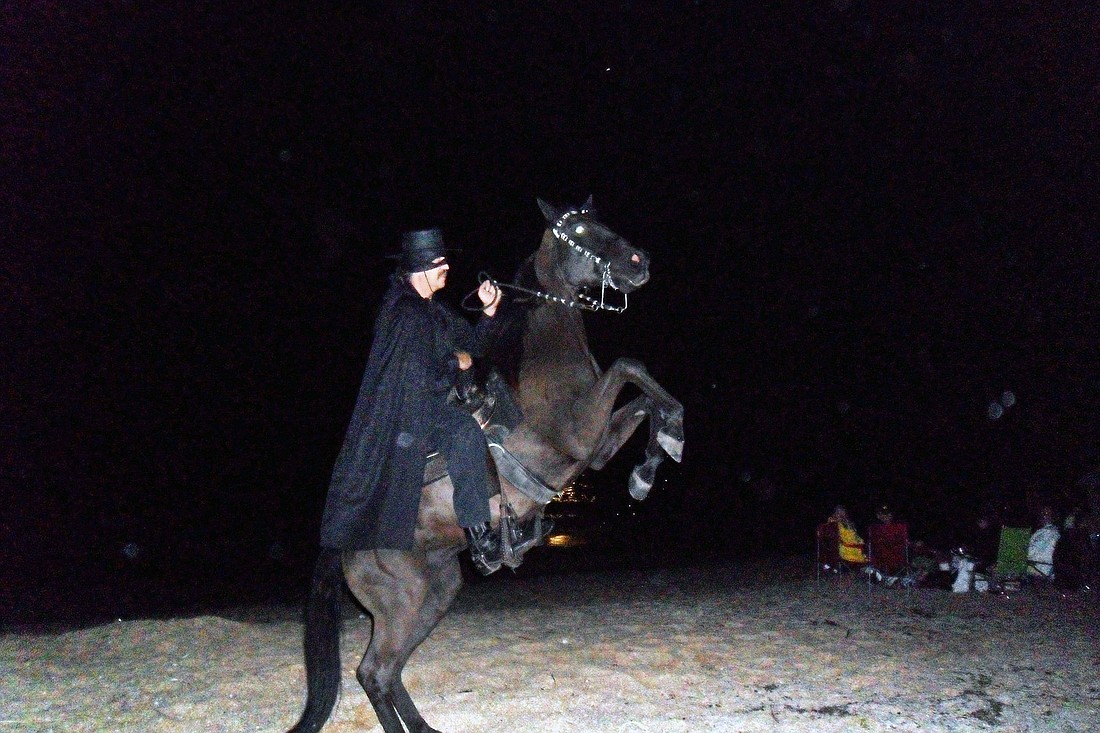- April 26, 2024
-
-
Loading

Loading

Drew Bulecza dresses as Zorro to bring attention to the mass herding and slaughtering of wild horses.
Decked out in full Zorro duds — black hat, mask, the whole deal — Drew Bulecza was stopped one day by a police cruiser while walking on a Flagler Beach street. He wasn’t charged or ticketed, but he was questioned. The deputy asked to take his picture, as a souvenir for his daughter.
“Everybody loves (the costume),” Bulecza says, which he wears to draw publicity for a “save the wild horses” initiative.
“That’s why I’m thinking I should really push this Zorro thing. He’s a hero in public eyes … (And) we fight to save those horses that built this country, but so few people even know about.”
Where there were once millions, only 20,000 free-roaming horses remain in this country, Bulecza says. There are 40,000 more in metal government holding pins, crammed so tightly inside that it is not uncommon for newly birthed calves to be trampled to death by overcrowding. Cattlemen want horses out of the picture, he claims — off western lands throughout Nevada and Wyoming — because they share grazing space with more than 300,000 cows, which are more profitable.
According to Bulecza, species with populations under 60,000 are considered endangered, but horses are classified as feral livestock. “So no one will protect them,” he says. Government is doing what it pleases, he says.
The Zorro gimmick started as a Halloween gag, then it blew up. Now, Bulecza, an Ormond Beach resident, attends local events in character, he speaks to youth groups and contacts congressmen. He’s also part of a “secret group” which organizes protest gatherings.
According to Bulecza, the Bureau of Land Management received $67 million from the government last year to “manage” horse populations.
Even if you’re not a horse lover,” Bulecza said, “you should be appalled at the wasteful spending … Do you know what we could do for those horses for $67 million? … This is why I go around dressed in a hat and a mask, because it gets people’s attention.”
Primary to Bulecza’s mission is to change the classification of wild horses from livestock to companion animals, giving them the same rights as other pets. “There are more horses in Florida than any other part of the world,” he says. “ … They’re all considered family ... They’re like our children.”
Still, the work isn’t easy, Bulecza says. For many advocates, the cause is expensive and time-consuming, it creates friction at home and it’s usually a losing battle. But it’s also pure, he says.
“(We) advocates have no hidden agenda,” he says, “we just want to save the horses … What did the bird do for us?” he asks. “Zero. But the mustang, the wild horses, actually built this country … They carried us into battle, they carried our supplies, they carried us out West to find our futures … Horses worked hoof in hand with us not just as workers but as our friends and family. They deserve more than to be swept away.”
Contact Mike Cavaliere at [email protected].